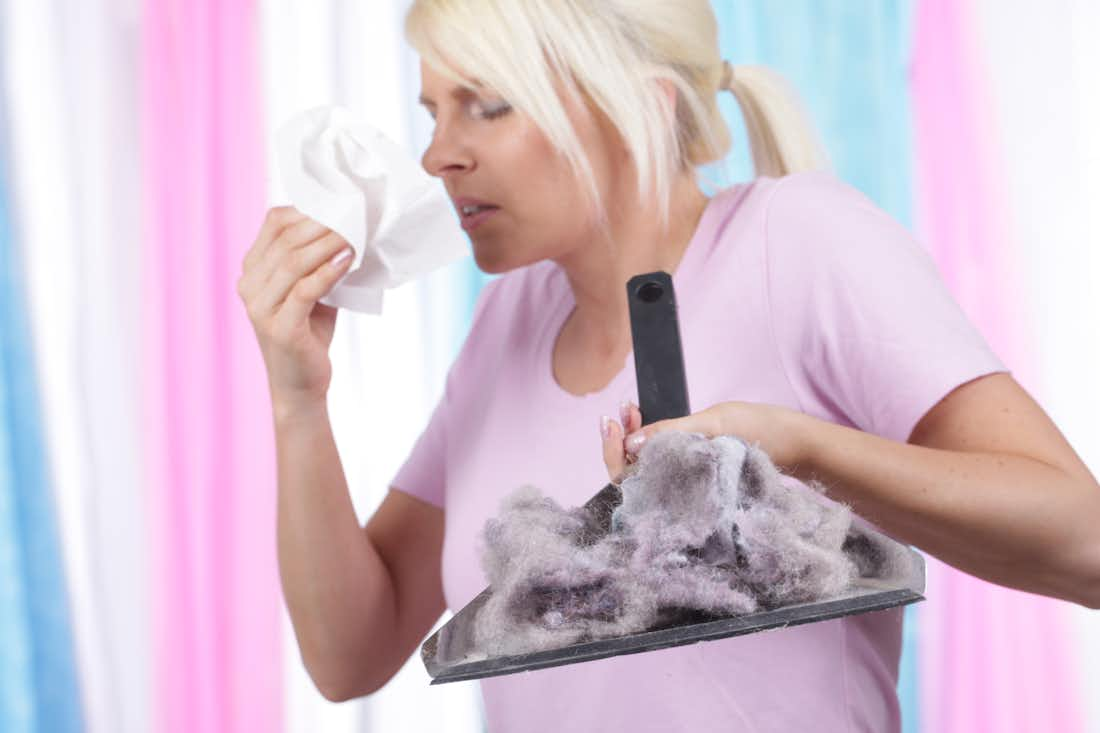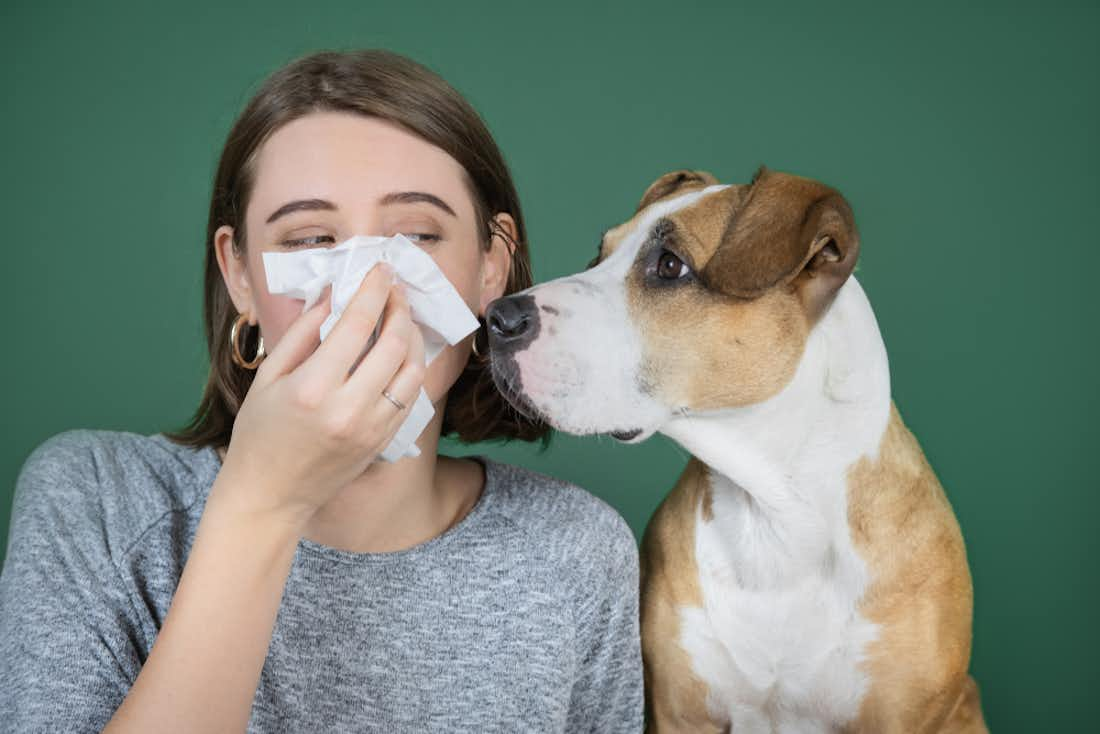Apr 14, 2022
How To Stop Allergies Fast
5 minute read
Allergies are like meatloaf day in the high school cafeteria. You can’t prevent it from happening, but you can try to avoid it at all costs. And while it’s hard to say if endless sneezing or mystery meat is a worse fate, we can tell you that allergies don’t need to be as misery-inducing as they already are.
When the symptoms of allergies start wreaking havoc, it’s time to fight back. Here are some of our favorite home remedies and clinically proven methods to nip allergies in the bud.
Figure Out Your Trigger
For people with food allergies that react from eating certain foods, it’s usually pretty clear what’s causing your immunological response. But for seasonal allergies or general nasal congestion in your home, it can be hard to identify the exact cause of your symptoms.
To stop allergies, you need to know what’s causing them.
If your symptoms worsen when you go outside, it’s likely a seasonal allergy, also known as hay fever. Frequent congestion or itchy eyes in the spring and summer are usually caused by tree or grass pollen. But if you’re coughing up a lung in the fall, it’s probably because of ragweed pollen.
On the other hand, if your throat closes when you hit the pillow, or your nose starts to run when you plop on the couch, it might be from an indoor allergy trigger. If you have furry friends, their pet dander might be sticking to your furniture and floating through the air. But it might even be caused by dust mites on your linens or mold spores in your basement.
But why guess what’s making you wheezy when you can figure it out, easily?
Allergy tests are an effective and comprehensive way to test for certain allergens so you can truly learn what to avoid.
Skin prick tests can be conducted by an allergist, who will poke your skin gently with a small needle. Then, a small amount of a specific allergen is placed over the testing area to see if your skin has an allergic reaction, such as a small bump in the area of the test. It’s relatively quick and painless, and it can give you conclusive results.
However, you can save a trip to the doctor by taking an allergy test right from home.
Cleared’s allergy test can scan for 40 indoor and outdoor allergy triggers so you can finally know if it's pets or pests that are bringing tears to your itchy eyes.
Home and Natural Remedies
Home remedies typically involve avoidance and preventative measures, which require you to know exactly what you’re allergic to. Once you’ve gotten tested and it’s all crystal clear, here are some ways to stop allergies from ruining your day.
Keep It Clean
If your allergies become worse when you step inside, there are a few measures you can take to decrease your symptoms. Dust mites are living organisms that are one of the leading causes of indoor allergens, and these little guys love to live on your bedsheets, rugs, couches, curtains, towels, and other soft items.
Wash your linens bi-weekly in hot water to kill off pests. Additionally, make sure you don’t air-dry them outside on a clothesline, as they might pick up pollen particles that will undo some of your hard work, too.
Pollen Count On It
If your allergies are horrible when you leave your home, it’s probably from some form of pollen in the air. Pollen count measures the number of pollen particles per cubic foot of air, and you can find generally this count on your local weather station’s website.
Typically, pollen counts are higher on windy, dry days where the particles can be easily spread through the air. On days like this, you may want to try to limit your exposure to the outdoors. If you need to venture out into the big, scary world of pollen, wear some sunglasses and a hat to prevent debris from entering your eyes or sticking to your hair.
Clear the Air
If things like pet dander or other indoor triggers seem to be bothering you, consider investing in an air purifier or HEPA filter. These help to draw out allergen particles from the air to help keep it filled with only the good stuff. They won’t, however, stop dust mite irritants according to most published research.
And if you have a mold problem in your basement or bathroom, consider getting a dehumidifier to bring down the moisture levels in these spaces. Fungi like mold thrive in humid and dark environments, as do dust mites, so using a dehumidifier can keep the relative humidity in a more comfortable range. Keeping humidity below 50% is ideal.
Other Remedies
Another remedy to consider is a neti pot. Neti pots can help clear out your sinuses for temporary relief if you’re feeling congested. Be sure to use your neti pot over the sink or a bowl to catch any water that falls, and use clean, ideally sterile equipment.
Medications
While preventative measures can keep you feeling cozy, there are some days where allergies are a real doozy. Over-the-counter antihistamine allergy medications like cetirizine, fexofenadine, or loratadine are by far the fastest and most effective ways to bring you some relief.
Histamines are a chemical that your immune system releases when confronted with a threat. However, if you have an allergy, your body mistakenly identifies the offending substance as harmful and releases the neurotransmitter anyway. The release of histamines causes the symptoms we know as allergies, like congestion, runny nose, watery eyes, coughing, and other kinds of unpleasantness.
Antihistamines are medicines that work to block the production of histamines so that you don’t experience symptoms as severely. You’ve probably taken oral antihistamines, which typically come in pill form; however, nasal sprays (like Azelastine) and eye drops are targeted antihistamines that provide near-immediate relief.
If you’re an allergy sufferer, you probably already know how expensive it can be to stock up on these types of medications. But you shouldn’t have to break the bank just to feel like yourself. Cleared has generic antihistamines for a fraction of the cost compared to their brand name counterparts.
Treatment
You won’t need to worry about stopping your allergies if you never even feel the symptoms in the first place. And while this might sound too good to be true, it’s a very real possibility.
Allergy immunotherapy works by gradually exposing you to an allergen over time through allergy shots or sublingual tablets. These incremental increases allow your immune system to develop a resistance to the substance so that you no longer have a severe reaction. It’s sort of like eating a piece of that school meatloaf every day until you’ve become desensitized to it. That said, immunotherapy is more pleasant.
While injections used to be the only way to effectively receive immunotherapy, a new form of treatment called sublingual immunotherapy (SLIT) is less invasive and can be done right from home.
With SLIT, you’ll place a tablet under your tongue and let it dissolve. It’s that easy. Over time, you’ll continue doing this until you experience improved tolerance to the allergan, for better productivity, general health, and more energy.
SLIT is also fully FDA approved, and you can get it without even needing to leave home. Take our free 5-minute quiz to get set up with an online allergist and see if immunotherapy is right for you.
Emergency Treatment
In some circumstances, individuals may experience a severe allergic reaction called anaphylaxis. Anaphylaxis is a potentially life-threatening reaction that occurs when the immune system releases a flood of chemicals that causes your body to go into shock. It can cause airways to narrow and make breathing difficult, and you may also experience nausea, dizziness, and swelling.
If this occurs, a shot of epinephrine is necessary. EpiPens® should always be carried on your person if you know that you have a severe allergy to certain foods or environmental triggers. While the epinephrine shot prevents the reaction from worsening and can literally be a lifesaver, you still need to get immediate medical attention afterward.
The Fast Lane
Allergies are an extreme nuisance that can turn a sunny day into a miserable one. But you don’t need to let allergies get the best of you.
Once you get an allergy test and you know exactly what’s causing your symptoms, you can start to take some preventative measures such as staying indoors on high pollen days and cleaning your bed sheets or linens frequently.
But when you need relief fast, antihistamine medications are the way to go. These block the production of histamines, a chemical that causes allergy symptoms. They’re available as oral pills, nasal sprays, or even eye drops.
And if you want to take it a step further, allergy immunotherapy can stop your symptoms from ever happening in the first place. Sound too good to be true? Cleared has everything you need to get started stopping allergies in their tracks.
Sources
Pollen Counts - Topic Overview | Kaiser Permanente
Antihistamines: Definition, Types & Side Effects | The Cleveland Clinic



